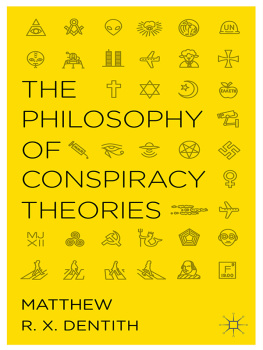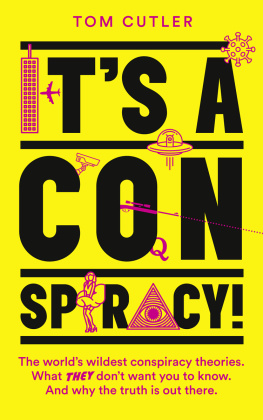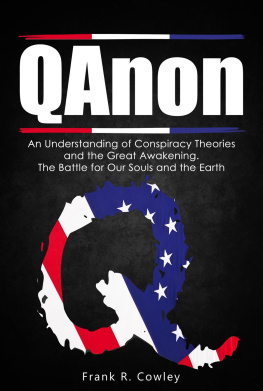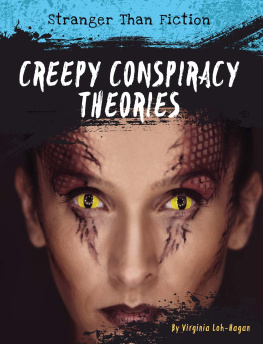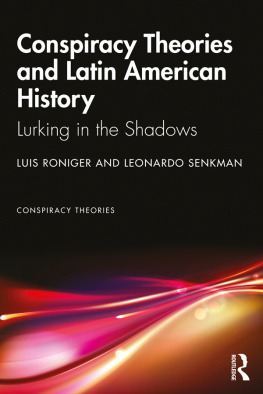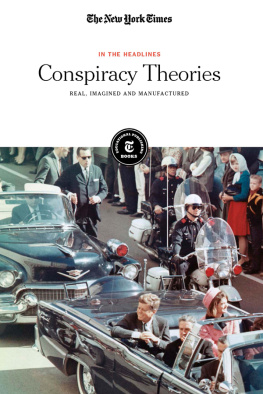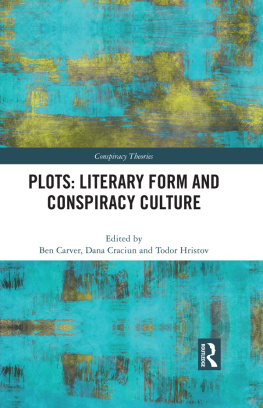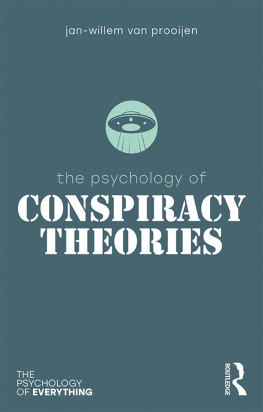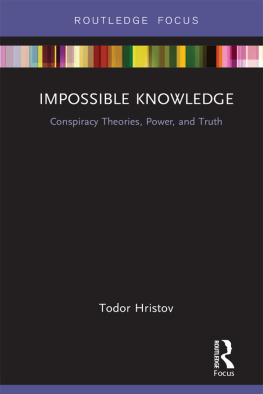The Philosophy of Conspiracy Theories
The Philosophy of Conspiracy Theories
Matthew R. X. Dentith


Matthew Richard Xavier Xander Xanthias Xerxes Xanatos X Dracos
Hieronymus Oliphant Ransome Dentith 2014
Foreword Charles Pigden 2014
All rights reserved. No reproduction, copy or transmission of this
publication may be made without written permission.
No portion of this publication may be reproduced, copied or transmitted save with written permission or in accordance with the provisions of the Copyright, Designs and Patents Act 1988, or under the terms of any licence permitting limited copying issued by the Copyright Licensing Agency, Saffron House, 610 Kirby Street, London EC1N 8TS.
Any person who does any unauthorized act in relation to this publication may be liable to criminal prosecution and civil claims for damages.
The author has asserted his right to be identified as the author of this work in accordance with the Copyright, Designs and Patents Act 1988.
First published 2014 by
PALGRAVE MACMILLAN
Palgrave Macmillan in the UK is an imprint of Macmillan Publishers Limited, registered in England, company number 785998, of Houndmills, Basingstoke, Hampshire RG21 6XS.
Palgrave Macmillan in the US is a division of St Martins Press LLC,
175 Fifth Avenue, New York, NY 10010.
Palgrave Macmillan is the global academic imprint of the above companies and has companies and representatives throughout the world.
Palgrave and Macmillan are registered trademarks in the United States, the United Kingdom, Europe and other countries.
ISBN: 9781137363152
This book is printed on paper suitable for recycling and made from fully managed and sustained forest sources. Logging, pulping and manufacturing processes are expected to conform to the environmental regulations of the country of origin.
A catalogue record for this book is available from the British Library.
Library of Congress Cataloging-in-Publication Data
Dentith, Matthew R. X., 1977
The philosophy of conspiracy theories / Matthew R.X. Dentith.
pages cm
ISBN 9781137363152 (hardback)
1. Conspiracy theories Philosophy. I. Title.
HV6275.D46 2014
001.9dc23 2014025888
.
Contents
Charles Pigden
Foreword
Consider the following argument (call it the Cecilia/Nixon Argument):
(1) Cecilia subscribes to the theory that Nixon and his henchmen conspired to cover up the Watergate break-in, which was itself instigated at their behest.
(2) Hence Cecilia subscribes to a theory that posits a conspiracy a secret (and sinister) plot to influence public affairs by partly secret means.
(3) Hence Cecilia subscribes to a conspiracy theory.
(4) Hence Cecilia is a conspiracy theorist.
(5) Therefore Cecilia subscribes to theory that is intellectually suspect and irrational to believe.
(6) Therefore Cecilia herself is irrational, if not mad at the very least a practitioner of the paranoid style in politics.
(7) Therefore it would be silly to accept or even investigate Cecilias theory.
What are we to make of this argument? Well, obviously it is valid enough up to step (4), but after that it goes violently off the rails. If (1) is the case, and Cecilia subscribes to the theory that Nixon and his henchmen conspired to cover up the Watergate break-in, then (2) she subscribes to a theory that posits a conspiracy. And if Cecilia subscribes to a theory that posits a conspiracy, then it presumably follows that (3) Cecilia subscribes to a conspiracy theory and therefore that (4) Cecilia is a conspiracy theorist. But does it follow from the fact that Cecilia subscribes to a conspiracy theory that (5) she subscribes to a theory that is intellectually suspect and irrational to believe? Obviously not. For the theory to which Cecilia subscribes is nowadays regarded as an established historical truth. Since premises of the form (3) can be true and conclusions of the form (5) can be false, it is clear that (5) does not follow from (3). But if (5) does not follow from (3), (6) does not follow from either (3) or (4), though we might be willing to grant that it follows from (5). (If it is irrational to believe in conspiracy theories, and Cecilia subscribes to a conspiracy theory, then it seems that Cecilia is thus far irrational.) Much the same goes for (7). If it is irrational to believe in conspiracy theories, then it is irrational to investigate them, since there is not much point in investigating a theory that would be irrational to believe. But (7) does not follow from (3). The fact that Cecilias theory is a conspiracy theory does not imply that it is irrational to believe it and hence does not imply that it would be irrational to investigate it (though in the present case investigation would be a bit redundant, since the facts are already in).
Well, so what? The Cecilia/Nixon Argument is obviously a dud, but defective arguments are a dime a dozen, so why should we worry about this one? Because arguments of this form, and every bit as bad as this, are insinuated and suggested day-in and day-out by politicians and pundits, often with an intolerably smug air of intellectual sophistication. Furthermore, despite their obvious fallaciousness, they often convince the voting public. The panjandrums start with the premise that somebody has posited a theory involving some conspiracy and conclude (reasonably enough) that the person has posited a conspiracy theory and is thus a conspiracy theorist. But they then go on to suggest that therefore the theory is crazy and not worth considering and that the theorist herself is several sandwiches short of the full picnic. Thus, perfectly plausible theories dont even get discussed. Tony Blair was a noted practitioner of these dark arts. Here, for instance, he manages to complete the inference in a few deft words. He had been asked about a leaked memo recording a conversation in which he had supposedly talked George W. Bush out of bombing Al-Jazeeras studios in Doha, presumably because Bush took exception to Al-Jazeeras news coverage of Iraq. Looking tired, [Blair] appeared to lose his cool when asked about reports claiming that the memo showed him talking Mr Bush out of mounting an air raid on al-Jazeera. Look, theres a limit to what I can say its all sub judice, he said [it was all sub judice because the leakers were being prosecuted, presumably at his behest]. But honestly, I mean, conspiracy theories ... (Daily Telegraph, 27 October 2005). One cannot but admire Blairs talent for sophistry even when under stress. The inference appears to be that because what was being suggested was a conspiracy theory it did not deserve to be discussed. So the Prime Minister was able to avoid answering or even discussing the allegation that his friend and ally, the President of the USA, was the kind of moral monster who would regard the murder of a bunch of journalists as a serious option because he did not care for the content of their news coverage.
So common is this tactic of arguing that a conspiracy theory is not worth discussing simply because it is a conspiracy theory that journalists investigating or hypothesising such theories feel compelled to deny either that the theories they are suggesting are conspiracy theories or that they themselves are conspiracy theorists, even when they are obviously propounding theories featuring conspiracies (I am not a conspiracy theorist but ....).
But surely arguments along the lines of the Cecilia/Nixon Argument cannot be as crudely fallacious as I have suggested. There must be
Next page
